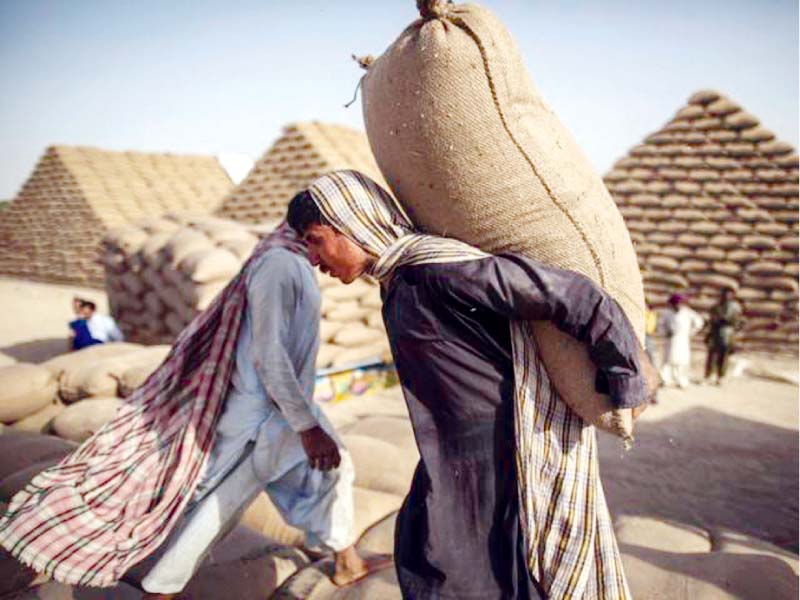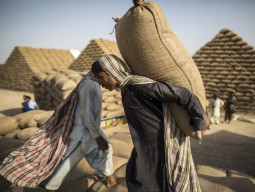
The Pakistan Flour Mills Association (PFMA) has announced that all flour mills of the country will stop the supply of the commodity from today [June 23] and will close operation from June 30 in protest against proposed increase in three taxes related to the flour milling industry.
“We will stop supplying flour from tomorrow and will stop operation from June 30. We have to resort to this protest due to unconcerned attitude of the government,” PFMA Sindh Zone Chairman Chaundhry Muhammad Yousuf said on Tuesday.
In the Finance Bill 2020-21, the federal government has proposed to abolish one per cent rebate on annual sales of flour mills; increase the sales tax on bran by 10% and the sales tax on import of machinery used for making flour by 7%.
The increase in turnover tax is expected to increase the price of a 20kg bag by Rs30 while the increase in sales tax on bran is expected to increase the price of each 20kg bag of flour by Rs67. The implementation of the taxes is likely to increase the price of a 20kg bag of flour by Rs97.
In a letter to Minister for Finance Shaukat Tarin, PFMA Chairman Asim Raza last week described the tax hike as the FBR's error and requested him to maintain the current rate of taxes.
Raza had told Tarin that at present the turnover tax imposed on the flour milling industry has been included in the lowest rate of the schedule under which 0.25% turnover tax is applicable on mills.
In the next financial year's budget, flour mills have been excluded from the lowest rate schedule and will now be subject to 1.25% turnover tax. If the new rate of turnover tax is implemented, the price of a 20kg flour bag may increase by Rs30 from July 1.
Raza had told The Express Tribune that the current sales tax concession rate on import of machinery used in flour making is 10% which is being increased to 17% in the next financial year.
At present a large number of new flour mills are set up across the country in which modern machinery is being imported from Italy, Germany, Switzerland and Turkey to improve the quality of flour. The imported machinery consumes very little electricity, time and water and thus helps save resources.
An increase in taxes will significantly increase the cost of imported machines by millions of rupees. At present, 65% of the total cost of setting up mills consists of purchase and import of modern machinery.
In the proposed finance bill, the sales tax rate on sale of bran has been increased from 7% to 17% which will have a direct impact on the price of flour.
At present, flour mills produce about 19kg of bran out of 100kg of wheat, with a current market price of Rs1,400 per 34kg bag. Due to separate sales of bran, the price of flour is kept low for the consumers.
In particular, the food department takes into account the price of bran while determining the official price of flour in consultation with flour mills. An increase in the sales tax on bran to 17% is expected to increase the 20kg bag of flour by Rs60 to Rs67.
To a question, the PFMA Sindh chairman said there is a need to import 3 to 4 million tons of flour in August in order to meet the local need. He said the country consumes 30 million tons of flour annually.
COMMENTS (2)
Comments are moderated and generally will be posted if they are on-topic and not abusive.
For more information, please see our Comments FAQ

1732184775-0/BeFunky-collage-(80)1732184775-0-165x106.webp)

1731933289-0/BeFunky-collage-(68)1731933289-0-165x106.webp)


1732179298-0/BeFunk_§_]__-(23)1732179298-0.jpg)

1732181665-0/Express-Tribune-(9)1732181665-0-270x192.webp)
1732178966-0/BeFunk_§_]__-(22)1732178966-0.jpg)
1732178488-0/Express-Tribune-(7)1732178488-0-270x192.webp)








Good article.
Rs 30 per 20kg should be the increase in price so from 860 it should be 890 and thats it we are talking about fine aata the chakki ata should also get just rs 30 per 20kg increase or rs 1.5 per kg the tax should be per kg increase not on the price sold